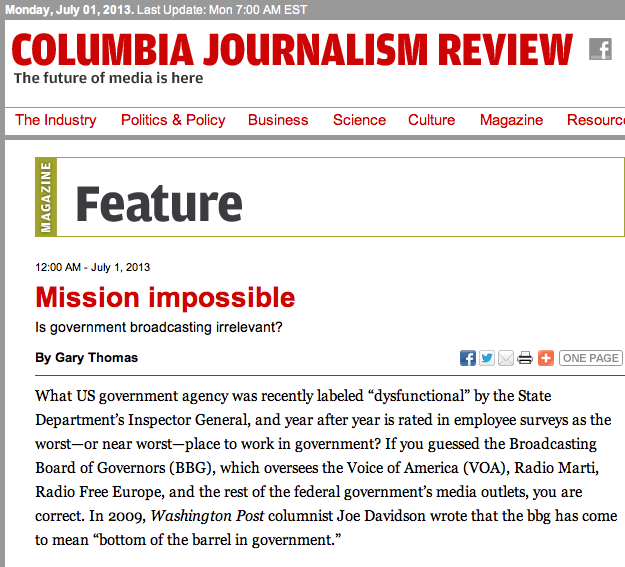BBG Watch Commentary
Gary Thomas, a former Voice of America (VOA) journalist, published a significant analysis and opinion article in Columbia Journalism Review about the current state of U.S. international broadcasting and VOA. He is asking whether government broadcasting is or can be relevant.
While one may agree or disagree with some of his observations and conclusions, Mr. Thomas is right about the management of the agency — its bureaucratic arm, the International Broadcasting Bureau (IBB). It is among the worst in the federal government as demonstrated by the federal Office of Personnel Management in numerous employee surveys.
True to their nature, IBB executives have shown their arrogance and contempt for distinguished former and current Broadcasting Board of Governors (BBG) journalists in their response to Gary Thomas’ article. We cite it here in full because their statement demonstrates better than anything else why Voice of America and the rest of U.S. international broadcasting are dysfunctional. VOA public relations staff works under management direction of IBB executives. IBB executives technically report to members of the bipartisan BBG Board, but in fact they manage the agency on their own, often in open defiance of BBG members with whom they disagree.
VOA was offered an opportunity to comment on the issues raised in this article, and questions were submitted to the agency for response. It declined to answer any of the questions. The VOA Public Affairs Office’s response was: “Frankly speaking, the questions submitted by Mr. Thomas, a former VOA employee, contain multiple errors and suggest a bias that concerns us greatly. We invite those who want to evaluate the quality of VOA journalism to look at our websites or our programs that reach over 135 million people each week in 45 separate languages.”
In his article, Gary Thomas wrote: “The core problem afflicting the BBG and its various entities is institutional schizophrenia. It is simultaneously a news organization trying to be a government agency, and a government agency trying to be a news outlet.”
He also noted that “VOA earned credibility around the world on the basis of its honest journalism, even when its stories conflicted with US policy.”
That credibility, according to Thomas is being threatened by IBB bureaucracy and VOA executives imported from CNN.
One result of this micromanaging is that a commercial mode has taken root at Voice of America, where the equivalent of chasing ratings has become paramount and the news has been trivialized in much the same way it has at networks and stations across the country. As a 2007 report by McCormick-Tribune Foundation put it, “Once the centerpiece in America’s arsenal for fighting the war of ideas through their trenchant and focused programming, American international broadcasting in recent years has lurched in the direction of becoming just another competitor in the crowded field of commercial broadcasters purveying a menu of entertainment, popular culture and news.”
The BBG brought in outside people, many of them former CNN managers, to sharpen this commercial-style focus. Hard news, the meat and potatoes of VOA since its inception, has been greatly de-emphasized. Pressure has increased for softer stories, usually of two minutes or less, which are then translated for use by the language services. (There is virtually no English-language television, and English-language radio programming has been drastically cut back, even though it’s the strongest medium to reach remote audiences that lack computers or TVs.)
READ MORE: Mission impossible by Gary Thomas, Columbia Journalism Review, July 1, 2013.
